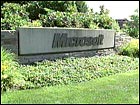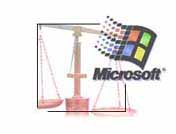|
Microsoft case in brief
|
 |
November 1, 2001: 6:49 a.m. ET
A quick glance at the entire Microsoft antitrust trial.
|
NEW YORK (CNNmoney) - Following is a chronology of key events in the legal battle between Microsoft Corp. and the Justice Department, a lawsuit that has spanned four years - and running.
October 1997 - The Justice Department sues Microsoft (MSFT: Research, Estimates), alleging the software maker required computer manufacturers to ship Microsoft's Internet Explorer Web browser on PCs loaded with Windows 95. Attorney General Janet Reno also asks a federal court to impose penalties of $1 million per day.
December 1997 - U.S. District Judge Thomas Penfield Jackson issues preliminary injunction forcing Microsoft to stop, at least temporarily, requiring manufacturers who sell Windows 95 to install Microsoft's Internet Explorer. The company appeals.
May 18, 1998 - Regulators from the Justice Department and 20 states launch one of the biggest antitrust assaults of the century, accusing Microsoft of using its dominance in computer software to drive competitors out of business. The filing comes after negotiations between the government and Microsoft officials break down.

|
|
|
Click here for CNNMoney.com's special section on the Microsoft trial. | |
Nov. 5, 1999 - U.S. District Court judge finds that Microsoft holds monopoly power in the market for PC operating systems, and the company's actions harmed consumers.
Nov. 19, 1999 - District Court judge appoints federal appeals judge, Richard Posner, to serve as a mediator to handle the negotiations between Microsoft and the government.
April 1, 2000 - Judge Posner announces the end of negotiations between Microsoft and the government after four fruitless months of talks, setting the stage for a verdict by Judge Jackson.
April 3, 2000 - Judge Jackson rules Microsoft violated the nation's antitrust laws by using its monopoly power in personal computer operating systems to stifle competition.
April 28, 2000 - The Justice Department and a group of state attorneys general ask Judge Jackson to split Microsoft into two separate companies: one devoted to the Windows operating system, and the second to Microsoft's other businesses, including popular software applications such as Microsoft Office.
Sept. 26, 2000 - In a victory for Microsoft, the Supreme Court declines to consider the government's bid to break up the software maker, choosing instead to send the case to a lower court.
Feb. 26, 2001 - Microsoft and the government square off during first day of two-day hearing on Microsoft's appeal of Judge Jackson's breakup order before seven judges of the U.S. Court of Appeals for the District of Columbia.
June 28, 2001 - U.S. Court of Appeals for the District of Columbia reverses Judge Jackson's ruling that Microsoft be broken into two companies. The Appeals Court vacated in full the final judgment and remanded the case to a new judge. Its decision questioned the partiality of Judge Jackson.
July 11, 2001 - Further signaling its willingness to settle its antitrust case with the government, Microsoft says it will give PC manufacturers more flexibility in configuring desktop versions of its Windows operating system.
Aug. 7, 2001 - Microsoft asks Supreme Court to take up the case.
Sept. 6, 2001 - The Justice Department decides it will not seek to break Microsoft Corp. in two during the next phase of the software maker's landmark antitrust case.
Sept. 28, 2001 - U.S. District Court Judge Colleen Kollar-Kotelly orders attorneys for Microsoft and the Justice Department into settlement talks. She says the talks should proceed "24 hours a day, seven days a week," and set a deadline of Nov. 2. If there is no settlement by then, Kollar-Kotelly said a hearing on what steps to take to curb Microsoft's abuses of antitrust law would start in March 2002.
Oct. 9, 2001 - The U.S. Supreme Court declines Microsoft's request that it overturn an earlier ruling by a lower court finding the company guilty of violating antitrust laws. The case returns to the district court for further settlement talks.
Nov. 1, 2001 - A day before a deadline set by the federal judge overseeing the case, Microsoft and the Justice Department reached a tentative agreement to settle the case, according to news reports. 
|
|
|
|
|
|

|

